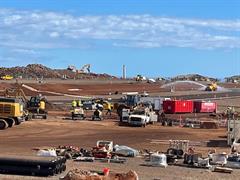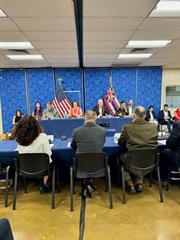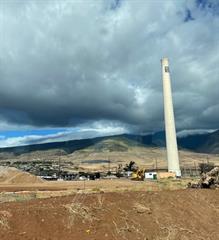Wildfire Recovery and Prevention
 My office and I remain fully focused on assisting all of our families and communities affected by the August 2023 Maui wildfires. I have joined my Hawai‘i Congressional delegation and our state, local and community partners in assuring that our federal government does all it can to respond fully at all levels to this tragedy.
My office and I remain fully focused on assisting all of our families and communities affected by the August 2023 Maui wildfires. I have joined my Hawai‘i Congressional delegation and our state, local and community partners in assuring that our federal government does all it can to respond fully at all levels to this tragedy.
While the federal response has been generally positive, clearly much more remains to be done, starting with continued federal funding for survivor assistance and recovery efforts. I have pursued and continue to pursue this assistance primarily through my Appropriations Committee, including my Homeland Security Subcommittee with jurisdiction over our main federal agency currently helping Maui, the Federal Emergency Management Agency (FEMA). As one example, I spoke about how FEMA’s assistance has been extremely valuable to the recovery process in a hearing with the then-Acting Administrator of FEMA in my Appropriations Homeland Security Subcommittee. You can watch my remarks here.
In addition, in March 2025 I again returned to Lahaina to get an in-person update on the recovery process. I was able to visit the Lahaina Courthouse area to learn more about the status of debris removal and FEMA Public Assistance, as well as the Kilohana Temporary Group Housing Site that can house up to 167 households.
Securing Federal Funding
 As a member of the Homeland Security Appropriations Subcommittee, I have continued to focus on securing the funding Maui needs to recover. For example, I helped secure $16 billion in additional FEMA funding nationally two months after the wildfires; much of this was allocated to Maui.
As a member of the Homeland Security Appropriations Subcommittee, I have continued to focus on securing the funding Maui needs to recover. For example, I helped secure $16 billion in additional FEMA funding nationally two months after the wildfires; much of this was allocated to Maui.
After securing those initial funds, I joined my Hawai‘i Congressional delegation partners in sending a joint letter to Congressional leadership that called for additional disaster and recovery funding, which helped lead to two Continuing Resolutions that secured additional funding for Maui. The first became law on September 26, 2024 and replenished the Disaster Relief Fund (DRF) that provides support for those affected by the wildfires. The second became law on December 21, 2024 and included $29 billion to replenish the DRF, $12 billion for Community Development Block Grant Disaster Recovery (CDBG-DR) funds, $1.5 billion for the Economic Development Administration (EDA) for disaster-related purposes, $2.2 billion to replenish the Small Business Administration’s (SBA) Disaster Loans Program and $210 million for the U.S. Coast Guard to respond to damage caused by various natural disasters, including the Maui wildfires.
As of the first anniversary of the devastating wildfires, the U.S. federal government had devoted nearly $3 billion to Maui’s recovery. As of December 2024, this included over $476 million in assistance to survivors, representing $63.3 million for 7,151 individuals and households and $412.9 million in SBA loans approved for affected Maui homeowners, renters and businesses.
Housing

In April 2024, I spoke about housing needs for wildfire victims in a House Appropriations Subcommittee on Homeland Security hearing. I asked Secretary of Homeland Security Alejandro Mayorkas about FEMA’s decision to focus on rehousing over rebuilding, underscoring the fact that leaving people in hotel rooms indefinitely was not a viable option.
To help address housing needs, the Hawai‘i Congressional delegation’s joint letter to Congressional leadership requested $3.5 billion for specific federal recovery funding referred to as CDBG-DR. This program funds state and local governments to rebuild housing and infrastructure in areas affected by major disasters, playing a critical role in long-term housing recovery, particularly for low and moderate-income populations. As noted above, Congress has officially funded the program as part of the December 2024 Continuing Resolution.
Support for Small Businesses
Businesses throughout Hawai‘i linked to Maui experienced a “severe economic disruption” following the wildfires.
To assist those businesses in need, in the 118th Congress (2023-2025) I introduced the Healing and Economic Advancement for Local Businesses in Maui (HEAL Maui) Act. The bill aimed to augment the SBA Economic Injury Disaster Loan Program by providing immediate advances, creating a new loan program modeled after the Payroll Protection Program and offering two-year loan deferments. In the 119th Congress (2025-2027), I will focus on new ways to help small businesses that are still struggling.
In addition, I worked with the Hawai‘i Congressional delegation to send joint letters to the SBA asking for loan deferments on COVID-19 Economic Injury Disaster Loans, which resulted in a six-month deferral for Maui businesses. We also asked the Internal Revenue Service to provide filing and payment extensions for individuals and businesses impacted by the Maui wildfires, resulting in a filing extension to August 7, 2024.
Prevention
We must also learn the lessons of Maui in order to prevent and mitigate further wildfire disasters, especially as
wildfire risks are high and growing throughout Hawai‘i. To this end, I worked with federal and local leaders to create
a comprehensive guide to federal resources to assist our Hawai‘i in
preventing, mitigating and responding to continuing wildfire risks across the state.
My Wildfire Prevention Plan identifies 12 key federal, state, county and
non-government organizations responsible for wildfire risk and response, along with key existing federal programs
offering financial and technical assistance. It also outlines specific further Congressional action items, from
increased annual appropriations to greater military participation and changes to federal programs to improve federal
participation and focus on specific needs.
My plan has guided my efforts to maximize federal assistance toward preventing, mitigating and responding to any other wildfire disasters statewide. Some successes thus far included the following provisions in the House’s (FY) 2026 draft appropriations bills:
- $123 million for the U.S. Department of Agriculture’s Wildlife Damage Management Program.
- $360 million for the FEMA Staffing for Adequate Fire and Emergency Response Program.
- $360 million for the FEMA Assistance to Firefighters Grants Program.
- Direction to our military to identify investments needed to support wildland firefighters located on Schofield Barracks.
Also included in the House’s FY 2026 Homeland Security Appropriations bill was $1 million for the Hawai‘i Emergency Management Agency’s Emergency Operations Center IT Modernization Project. This is a Member-designated Community Project Funding projects that specifically focuses on local needs in Hawai‘i. The project will fund the procurement and installation of touchscreen monitors for a new information wall at the emergency operations center to facilitate emergency response communications and instantaneous information sharing.
As my Appropriations Committee works to finalize our funding bills for FY 2026, I will continue to advocate for these programs and those that are risk from misguided funding cuts. For example, I spoke against potential cuts to FEMA in our FY 2026 Homeland Security Appropriations bill, which you can watch here.
I have also sent multiple letters to federal agencies on key issues related to wildfires in our state. I have asked agencies to improve federal coordination efforts on wildfire responses, requested the Army to advance efforts to build a new wildfire fighting headquarters on O‘ahu, and urged the Department of Interior to better support wildfire firefighting efforts in geographically isolated areas in the Pacific. I also sent letters to FEMA on the timeliness of its Hazard Mitigation Assistance application review process and emergency responder training in remote and rural areas.
EDA Long Term Recovery Funding
The December 2024 Continuing Resolution included $1.5 billion for the EDA to support disaster recovery across the country, including in Hawai‘i. This funding will help address the ongoing impacts of natural disasters like the Maui wildfires. Our Hawai‘i Congressional delegation strongly advocated for this support, including through a joint letter to House leadership urging additional disaster and recovery funding.
The EDA issued its FY 2025 Disaster Supplemental Notice of Funding Opportunity, announcing that is accepting applications on a rolling basis in areas where a major disaster was declared due to events like wildfires, floods or other natural disasters in 2023 or 2024. Eligible applicants include state and local governments, nonprofits, tribes, higher education institutions and public-private partnerships working on economic recovery and resilience efforts.
Applications must be submitted online through the EDA’s Grants Experience portal at https://www.eda.gov/strategic-initiatives/disaster-recovery/supplemental/2025. For guidance and technical support, I encourage interested applicants to contact Keoki Noji, the EDA’s Economic Development Representative for Hawai‘i, at knoji@eda.gov. My office is also happy to provide Congressional letters of support for eligible applications. Requests can be directed to Kirra Empting in my Honolulu office at kirra.empting@mail.house.gov.
You can review more details of my efforts to help Maui and prevent future wildfires here.

 My office and I remain fully focused on assisting all of our families and communities affected by the August 2023 Maui wildfires. I have joined my Hawai‘i Congressional delegation and our state, local and community partners in assuring that our federal government does all it can to respond fully at all levels to this tragedy.
My office and I remain fully focused on assisting all of our families and communities affected by the August 2023 Maui wildfires. I have joined my Hawai‘i Congressional delegation and our state, local and community partners in assuring that our federal government does all it can to respond fully at all levels to this tragedy.
 As a member of the Homeland Security Appropriations Subcommittee, I have continued to focus on securing the funding Maui needs to recover. For example, I helped secure $16 billion in additional FEMA funding nationally two months after the wildfires; much of this was allocated to Maui.
As a member of the Homeland Security Appropriations Subcommittee, I have continued to focus on securing the funding Maui needs to recover. For example, I helped secure $16 billion in additional FEMA funding nationally two months after the wildfires; much of this was allocated to Maui.
